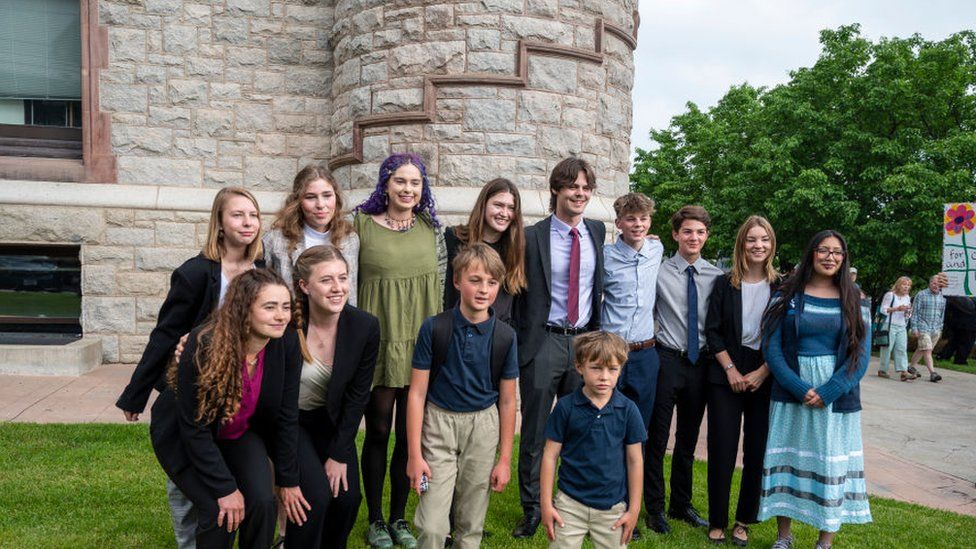ARTICLE AD BOX
 Image source, Getty Images
Image source, Getty Images
By Samantha Granville in Montana & Chloe Kim in New York
BBC News
A Montana judge has sided with 16 young activists finding that the state violated their right to a "clean and healthful environment", which the state constitution guarantees.
The plaintiffs, between ages five and 22, alleged the state's pro-fossil fuel policies contributed to climate change.
Similar cases have been brought forward by other youths, but this was the first case to go to trial.
The state attorney general plans to appeal the ruling.
Rikki Held's family farm
Montana has piercing blue skies that appear bigger and brighter than just about anywhere else in the country. With its tall mountain ranges that open onto vast green fields, it gives 360 degrees of picture-perfect views.
"It's wonderful being able to grow up here. And it's such a beautiful place," Rikki Held, the 22-year-old lead plaintiff in the lawsuit, told the BBC earlier this summer.
She grew up on a sprawling 7,000-acre ranch in Broadus, Montana. Learning about climate change in school, Held thought it was something that impacted polar bears and ice caps far away from her home. But over the last several years, she says she's seen worsening flash flooding, droughts, and wildfires that have negatively impacted crops and livestock on her family's ranch.
Held felt she had no choice but to get involved with climate advocacy groups, like "Our Children's Trust" an Oregon based non-profit, which has sued state governments on behalf of youth in all 50 states.
"[The state is] permitting and promoting a fossil-fuel based energy system, and that's contributing to climate change emissions," Held said. "It goes against some of our basic rights that are written in our constitution."
Citing a 50-year-old clause in the constitution that guaranteed the "state and each person shall maintain and improve a clean and healthful environment in Montana for present and future generations", the lawsuit targeted a 2011 state law that made it illegal for environmental reviews to consider climate impacts when deciding on new projects, like building new power plants.
On Monday, District Court Judge Kathy Seeley found the state's approval process for fossil fuel permits is unconstitutional, as it does not evaluate the effects of greenhouse gas emissions.
"Montana's emissions and climate change have been proven to be a substantial factor in causing climate impacts to Montana's environment," wrote Judge Seeley. "Plaintiffs have proven that as children and youth, they are disproportionately harmed by fossil fuel pollution and climate impacts."
Julia Olson, the lead attorney for Our Children's Trust, called it a "huge win for Montana, for youth, for democracy, and for our climate".
"More rulings like this will certainly come."
Similar cases will soon be heard in several other states, including Hawaii, Utah and Alaska, as well as in countries like Australia, New Zealand, Pakistan, Colombia and Uganda.
Kian, another young plaintiff, said in a statement: "We are heard! Frankly the elation and joy in my heart is overwhelming in the best way."
Image source, Getty Images
Image caption,Rikki Held says she's seen how climate change has made it harder for her family's farm to thrive
The lawsuit has divided Montanans between the treasures below ground and the environment above.
Montana holds 30% of the country's recoverable coal reserves and produces the fourth-most coal among the US states.
It brings in millions and millions of dollars of revenue every year for the state and jobs in the coal industry pay 30% more than the median income in the state. The lawsuit has proved especially contentious with the many Montanans who work in the coal industry.
About 112km [70 miles] northwest of Held's family farm is the small mining town of Colstrip, which sits in the shadows of the tall smokestacks of one of the state's biggest power plants. In Colstrip, everyone knows everyone, and everyone lives and breathes coal.
Joe Navasio worked as a miner for 40 years in the town. He moved to Colstrip before the coal boom in the 1970s and helped build it into the community that it is today. Take away coal, according to Joe, and there will be nothing left.
"This whole town was designed for one thing," he exclaimed. "To provide the northwest with electricity. If you want to turn your lights on, you need us."
Mr Novasio sees climate change as a global issue that can't be solved in Montana.
"We are a pittance of the problem," he said. "You can't measure us against the rest of the world."
Mr Novasio sees the climate case as an example of environmental groups using children to push forward their agenda
"I haven't seen one solution," he said, speaking about the court case. "What about those poor kids in Colstrip? What about them? What about their parent's jobs? I don't see anybody running to our rescue."
The state is currently appealing the ruling. If the judge's decision is upheld, the state legislature will have to redraft its environmental review policies to take climate change into consideration for future power projects.
Emily Flower, spokesperson for Montana Attorney General Austin Knudsen, called the ruling "absurd".
"Montanans can't be blamed for changing the climate - even the plaintiffs' expert witnesses agreed that our state has no impact on the global climate," Ms Flower said.
During the trial in June, the 16 plaintiffs presented evidence that carbon dioxide emissions contribute to hotter temperatures and more wildfires, which in turn is harming their physical and mental health.
The state argued that even if Montana stopped producing carbon dioxide, it would not stop the acceleration of climate change since other states and countries still contribute to fossil fuel emissions.

 1 year ago
35
1 year ago
35








 English (US) ·
English (US) ·